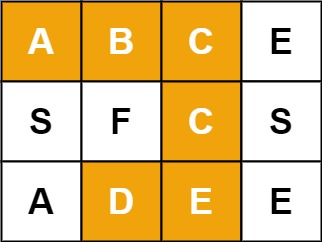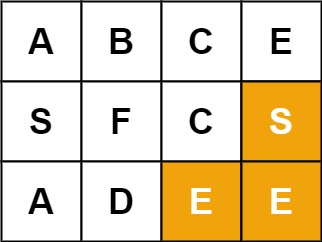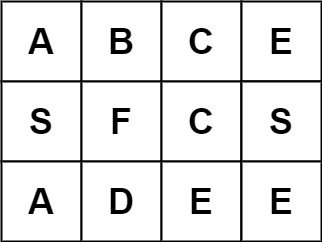LeetCode-in-All
79. Word Search
Medium
Given an m x n grid of characters board and a string word, return true if word exists in the grid.
The word can be constructed from letters of sequentially adjacent cells, where adjacent cells are horizontally or vertically neighboring. The same letter cell may not be used more than once.
Example 1:

Input: board = [[“A”,”B”,”C”,”E”],[“S”,”F”,”C”,”S”],[“A”,”D”,”E”,”E”]], word = “ABCCED”
Output: true
Example 2:

Input: board = [[“A”,”B”,”C”,”E”],[“S”,”F”,”C”,”S”],[“A”,”D”,”E”,”E”]], word = “SEE”
Output: true
Example 3:

Input: board = [[“A”,”B”,”C”,”E”],[“S”,”F”,”C”,”S”],[“A”,”D”,”E”,”E”]], word = “ABCB”
Output: false
Constraints:
m == board.lengthn = board[i].length1 <= m, n <= 61 <= word.length <= 15boardandwordconsists of only lowercase and uppercase English letters.
Follow up: Could you use search pruning to make your solution faster with a larger board?
Solution
defmodule Solution do
@spec exist(board :: [[char]], word :: String.t) :: boolean
def exist(board, word) do
board =
board
|> Enum.map(&List.to_tuple/1)
|> List.to_tuple()
w = tuple_size(board) - 1
h = tuple_size(elem(board, 0)) - 1
for i <- 0..w, j <- 0..h, reduce: false do
found -> found || find(board, word, i, j, w, h, [])
end
end
defp find(_board, "", _i, _j, _w, _h, _visited), do: true
defp find(board, <<char, rest::binary>>, i, j, w, h, visited) do
cond do
i < 0 -> false
i > w -> false
j < 0 -> false
j > h -> false
elem(elem(board, i), j) != char -> false
{i, j} in visited -> false
true ->
visited = [{i, j} | visited]
find(board, rest, i - 1, j, w, h, visited) ||
find(board, rest, i + 1, j, w, h, visited) ||
find(board, rest, i, j - 1, w, h, visited) ||
find(board, rest, i, j + 1, w, h, visited)
end
end
end

